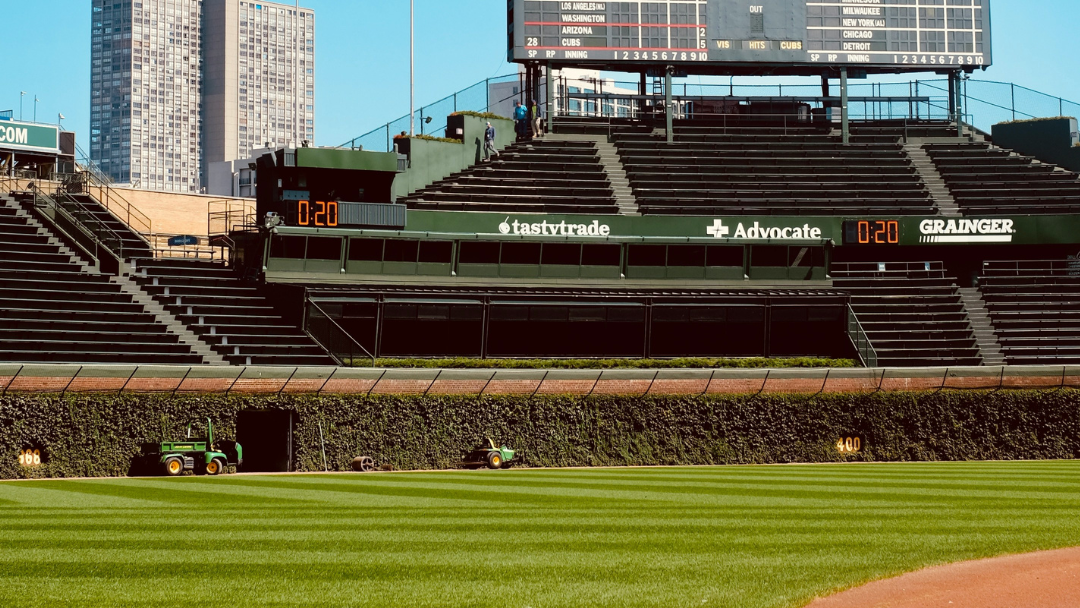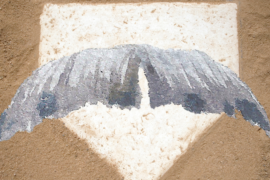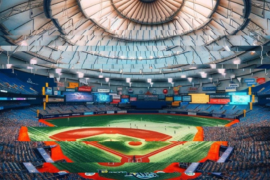My relationship with sports directly parallels the rise and fall and slow repair of my relationship with my dad. He was my best friend. He perfected the art of throwing a diving-catch, leaning on his back foot and threading a pop-up through the limbs of the oak tree, one of five in the front yard, the ball disappearing briefly behind the trunk as I sprinted from the stump in what felt like center field to the ditch in the easement, the left field line, the ball materializing as I layed out. One more diving catch! became my catchphrase. He couldn’t make it too difficult or too easy. If I didn’t have to dive, it wouldn’t be a suitable final note, and I would protest returning inside to help with the groceries or eat lunch or watch the second half of the Bears’ game.
In that same front yard, raking the fallen leaves into an old ragged sheet, pulled taught at the corners by our heels, we improvised a parody of the Marines’ Hymn that hasn’t been relevant for twenty years: From the returns of Jerry A—zumah to the tackles of Urlacher etc etc. It still gets stuck in my head. Once the Cubs were mathematically eliminated – we’ll get to 2003 – the oaks became linebackers and the driveways became endzones, acorns denting the roof of the minivan as I launched off the rear bumper to catch a touchdown pass. Pop-Pop, my dad’s dad, told me a story at Easter one year about the baseball coach, who asked him how his grades were, relieved to hear that they were good, and told him to stick with that. At the time, I still thought I was different. I still thought, despite a lineage of lawyers and academics, that I would go pro.
In 2003, it was tempting to blame Bartman, but it wasn’t his fault. With two on and one out and a two-run lead in the eighth, Miguel Cabrera hit a bouncing ball to Alex Gonzales at short, a tailor-made double play, but he didn’t try. I’ve learned to forgive a lot of people in my life, even, occasionally, myself, but rewatching that video, I well up and look at his face with disdain. It all mattered so much back then. The ball hit off the heel of his glove and fell helplessly in the dirt. Watch it all the way in! I can still hear my coaches say. Two hands! But no. That loaded the bases. The Cubs gave up eight runs in the inning and blew a shot at the World Series. I tore the posters off my wall. Threw the jerseys under my bed. Vowed to never again subject my heart to such pain, over which I had no control. Baseball was my identity back then. I was Bobby Baseball. Without the Cubs, I had four blank walls full of thumb tacks and an identity crisis.
Then I went to high school, and my dad moved to North Carolina for work, and he and sports lingered in my life, returning every few weeks to remind me that our best days were behind us. I rode the bench freshman year and then got cut. I visited him over spring break, and we went to a minor league game, the Durham Bulls, and the fitted hat was half an inch too small, a painfully symbolic detail. He later recalled me venting to him over the phone – in those days, I perceived my mom’s stoic response to our fractured family as emotionless, robotic – but nothing changed. For a family of lawyers and academics, we sure failed to communicate. Exhibit A: the time he came home, and I asked him to read my essay, and he rattled off his criticism, and I punched him in the face. In retrospect, a cry for help. I remember scampering to my room – he was bigger than me – but we didn’t address that either. If we could only talk about sports, how could we possibly maintain a meaningful relationship?
For years, we couldn’t. To the rest of the world, I was intent on becoming a sports journalist, but that was a facade, an old self. One day, I would be on WGN radio, which my mom listened to religiously, and there’d be this beautiful moment when she heard her son’s voice. A scene from a parallel universe. Instead, the page became my confidant. I turned inward. The ERAs I memorized were replaced by lyrics. Adolescence spares no one. During welcome week at Illinois Wesleyan, I sat at a round table with a white table cloth, one of many in the banquet hall, and listened to a man whose name I no longer recall, a sports journalist (how fitting), who said he entered the industry because he wanted to go pro, but as soon as he got cut and later accepted his limitations, he realized that this career was the closest he could get. I balked. No disrespect to him, but my aspirations exceeded mere proximity to a dead dream. I had a purpose, if only I could find it. My writing was meant to do something. On the white table cloth sat a card, on which I was to write my life’s goal in one sentence. I remember the infinitives: to use sports to illuminate the human condition. Use was an interesting choice, as if sports had gone from the subject to the tool. But the human condition? What did I even mean?
I got my answer eight years later, when I graduated from an MFA program and set out to write a novel. In the meantime, the Cubs won the World Series, their first in my dad’s lifetime, already more than in Pop-pop’s. I lived near Clark and Addison at the time and walked the streets of Wrigleyville as plastered fans climbed stoplights, but I felt like a ghost, detached. I had kept my vow to not be vulnerable and, consequently, had no love to celebrate. My dad moved back to Chicago, now that I no longer needed his advice. It was my turn to leave. San Francisco for my MFA. Geographically, we were farther apart than ever before (aside from a semester abroad), but something changed.
I started sharing my writing again. He was my first and most trusted editor as a kid, before I even knew good writing, before that fateful punch. I’ve read worse, he said about the first essay I sent him – and paid for it. Not what I would call high praise, but a big improvement. I wrote about the very subjects we couldn’t discuss, often at a slant, and he made comments in the margins. Until recently, that was the sole vehicle for our communication. I met a homeless man in San Francisco, Pepe, who told me about when he was a child and committed manslaughter with a baseball bat. Whether or not he was lying, I was rapt and began talking to him routinely, which wasn’t difficult, since he frequented the coffee shop where I worked to collect the expired pastries. Pepe planted the seed that has grown into my first novel, a writing process that has helped bridge the gap between past and present, between my dad and me.
I was at a Cubs’ game last summer with a childhood friend a month after his dad’s funeral and a month before my mom’s. We sat on the third base side beneath a light rain. We mimicked the phrases of our youth with love: Two hands! Get em next time! Play the ball; don’t let the ball play you! The last of which was a favorite of my Pop-pop, who, ironically, relinquished control to alcoholism after his wife died. My mom’s chemo was going about as well as could be expected, and she replied yes to my cousin’s wedding in the fall. My friend and I had all of our twenties to discuss, and as the topic shifted to the book, I knew he would connect to its themes – baseball, family, violence – but I didn’t have a title yet. He turned to me, and the sun joined the rain in a moment of clarity: America’s Pastime.
ROB BAILEY earned his MFA from California College of the Arts. He cherished his subsequent time in residence at NES in Iceland and Craigardan in the Adirondacks. He now lives with his Shiba Inu in Chicago, where he works for an education non-profit while finishing his debut novel.
Like what you’re reading?
Get new stories, sports musings, or book reviews sent to your inbox. Drop your email below to start >>>
NEW book release
Direct Connection by Laura Farmer. Order the book of stories of which Mike Meginnis says there is “an admirable simplicity at their heart: an absolute, unwavering confidence in the necessity of loving other people.”
GET THE BOOK



